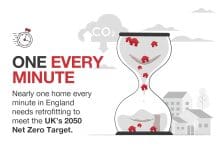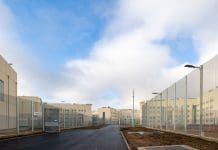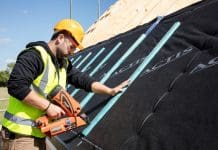Retrofitting existing buildings to make them more energy efficient is critical if the UK is to hit 2050 net-zero carbon targets, new research from WSP has revealed
A survey of over 100 built environment experts including leading architects, property developers and public and private sector building administrators, showed that over half (51%) consider ‘energy efficiency and decarbonisation’ as the most important outcomes for the retrofit of buildings, with only ‘safety and security’ ranking higher.
85% of those surveyed in WSP’s ‘Rethink Retrofit’ report said there is not currently enough legislation around retrofit project investment in their region, which in turn is slowing progress towards achieving net-zero carbon emissions.
Retrofitting existing buildings is a major priority
With 80% of the buildings required in 30 years’ time having already been built and almost half of the UK’s carbon footprint coming from the built environment, retrofitting existing buildings through new technologies, improving energy efficiency and more effective building management systems should be a major priority.
When those surveyed asked how they would rate the average energy efficiency improvement they would expect to achieve by retrofitting a building or buildings over the next five years, almost two-thirds (65%) of respondents said it would be either a ‘good’ or ‘very high’ improvement.
Nick Offer, head of UK building services at WSP, says: “If we want to achieve a more responsible, climate-friendly society, demolishing properties and replacing them with more sustainable ones doesn’t add up. It’s not cost-effective and doesn’t fit with our aspirations to nurture a circular economy that minimises the impact of building materials and construction processes on the environment.”
Innovation in energy needed
To be successful in retrofit projects, 51% of respondents think that more innovation in renewable power generation and storage is needed, with 48% agreeing that solar power will provide the biggest performance gain on retrofit projects over the next two years.
As well as this, digitalised energy systems, which could feed into smart meters or energy use apps, look set to allow customers greater control over their energy use – to the point where efficiencies can result in a surplus of energy.
“The survey showed that half (50%) of respondents believe that net-zero carbon buildings will soon be able to generate income by selling excess energy.
Offer continued: “We seal our buildings up instead of letting them breathe, then design systems to cool spaces down. We live in a temperate climate with an outside temperature of 17‒18 °C for much of the year. Applying an element of mixed-mode ventilation would be more suitable.
“We need to think differently about how we’re using energy.”
National retrofit campaign
An ambitious national retrofit campaign is required to reduce building emissions. It is one of many actions which needs to be taken to achieve the UK’s net-zero 2050 target, including the decarbonisation of transport and industry, utilisation of hydrogen and carbon capture and storage (CCS) technology and reforestation.














